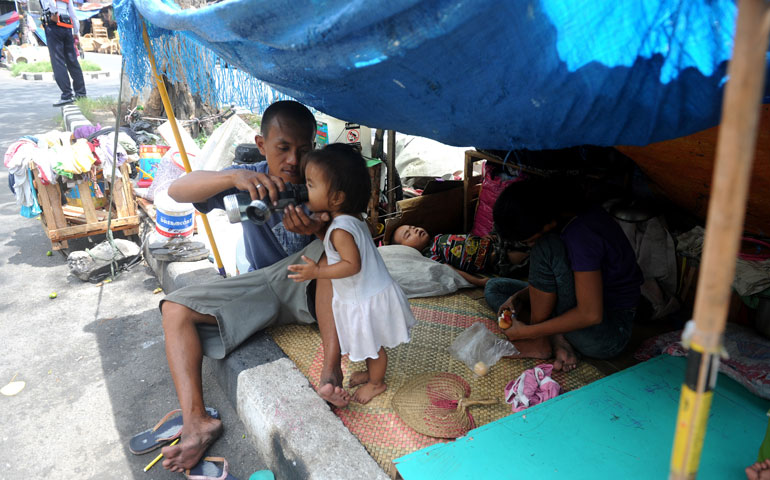
A homeless family lives in a makeshift shelter along a street in Manila, the Philippines, April 23. (Getty Images/AFP/Noel Celis)
President Benigno Aquino III is expected to highlight his anti-corruption agenda and the economic growth seen in the first half of his term when he addresses the joint session of the Philippines' 16th Congress at its formal opening July 22.
However, church leaders and nongovernmental groups hope the president's emphasis will be on narrowing the gap between rich and poor Filipinos, with priority placed on agrarian reform.
In the first quarter of 2013, the Philippines economy posted a 7.8 percent growth in gross domestic product, the highest growth rate recorded under Aquino's term. The rise marked the third consecutive quarter of more than 7 percent growth, according to the National Statistical Coordination Board.
The statistical board credited the GDP boost to "upbeat business and consumer sentiment" and sustained government capital expenditure.
Aquino's allies in Congress and the Department of Justice are expected to push ahead with the president's campaign platform of anti-corruption.
"It's clear there are more reforms up [the administration's] sleeves, particularly in the area of the economy," said Randy David, a sociologist and political analyst.
Furthering reforms was part of the president's campaign strategy for the May 13 general elections, David said, and by gaining "an unshakable majority" in the Senate and the House of Representatives, Aquino will find it easier to pass priority bills.
Church officials and nongovernmental organizations, however, have questioned the government's reports of economic growth. Speaking on the church-run radio station Veritas 846, Catholic Bishops' Conference of the Philippines president Archbishop Jose Palma of Cebu challenged Aquino to tell the truth about the country's economy. The national statistics board reports 28 percent of the 96.8 million Filipinos live in poverty, and Palma questioned the government's claim of economic growth when so many Filipinos are going hungry.
The gap between poor and rich Filipinos is widening, said Manila Auxiliary Bishop Broderick Pabillo, chairman of the bishops' National Secretariat for Social Action-Justice and Peace.
In a Veritas 846 interview, Pabillo urged the government to distribute almost 3 million acres of land to farmers as mandated by the Comprehensive Agrarian Reform Program launched when the president's mother, Corazon Aquino, was president from 1986 to 1992.
The Association of Major Religious Superiors of the Philippines also urged Benigno Aquino to give priority to distributing land to farmers and to provide training and support services so farmers can manage the land.
"While we recognize that the government's anti-corruption campaign is very strong, good government is not only about carving out corruption," said Carmelite Fr. Marlon Lacal, the association's executive secretary. Enabling farmers is essential to "uplift the lives of the poor," Lacal said.
Members of the association agreed that government priorities should include pushing the creation of laws and action on agrarian reform, human rights violations, ecology and protection for truth tellers or anti-corruption whistle-blowers -- all areas reported by the religious superiors' countrywide network to have "major deficiency."
For example, Lacal said, the government says there is a ban on logging, but the association had heard reports of illegal logging in forested areas in Mindanao and in the north.
Likewise, Lacal said human rights violations, including extrajudicial killings and abductions, go uncovered. "The victims are not known, so these aren't given much publicity and attention because they are not high-level cases," he said.
David said he sees a three-pronged strategy for the future of Aquino's government.
First, he said, Aquino would continue the country's labor export program, which he called "our milking cow." Between April and September 2011, approximately 2.2 million Filipinos left the country to work abroad, according to the 2011 Survey on Overseas Filipinos from the National Statistics Office. Church groups working with migrants place the number even higher, estimating at least 4 million overseas workers, including undocumented migrants.
These overseas workers sent a record $21.4 billion back to the Philippines in 2012, the Central Bank reported in January. Remittances from overseas workers accounted for 8.5 percent of the country's total economic output for 2012, the bank reported. Earlier this year, Amando Tetangco Jr., governor of the Central Bank of the Philippines, said demand for overseas workers and the expansion of remittance centers abroad drove January remittances up 7.2 percent from the previous year.
David said a second aspect of Aquino's potential strategy would be to maintain a focus on the service industry, including call centers, malls and tourism. These have been sources of employment, David said, and "the only growth we can find now is really consumption-driven growth."
The only investment-driven growth David could foresee would be in mining and energy facilities, such as coal plants.
Aquino was the clear winner in the May 13 midterm elections. Of the 12 Senate seats up for grabs, nine were won by "Team Pinoy" coalition candidates. (Pinoy is Aquino's nickname.) The opposition United Nationalist Alliance picked up the remainder. When the Senate reconvenes at the end of June, the administration's coalition will number 15 in the 24-member chamber.
In the House of Representatives, Aquino's Liberal Party won a solid 110 seats, which with his coalition partners will allow him to maintain an overwhelming majority in the lower chamber, becoming the country's only president to enjoy a clear majority in Congress since democracy was restored in 1986.
The incoming Congress will have a total of 292 members, the largest in its history, made up of 234 legislators elected from districts and 58 representatives elected by a party-list system, which seeks to give equal representation to underrepresented sectors, parties and causes.
[N.J. Viehland writes for NCR from the Philippines.]


